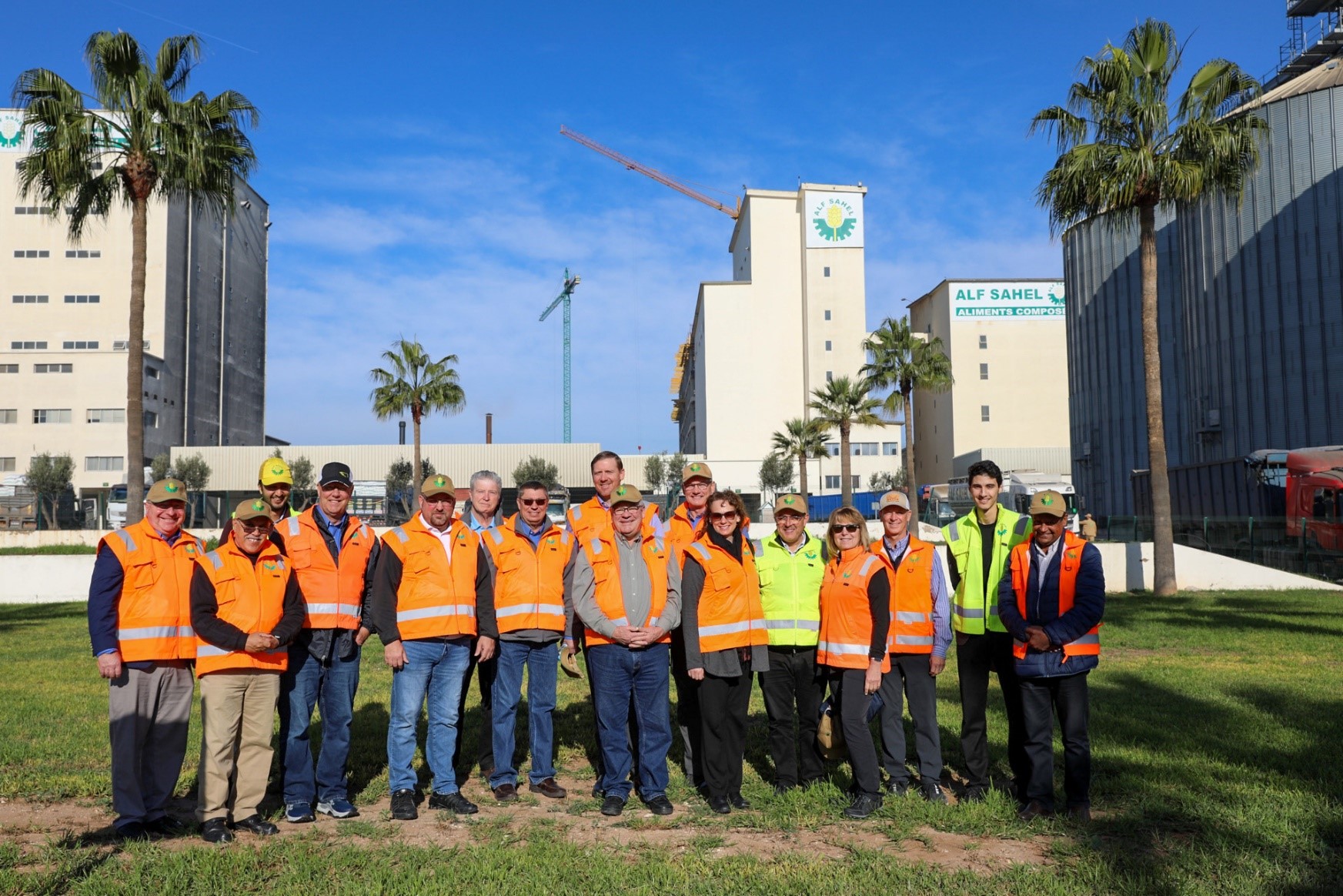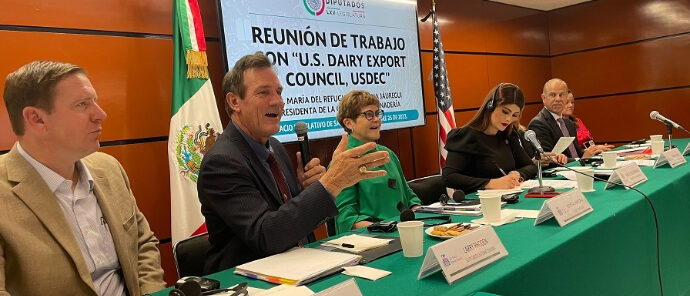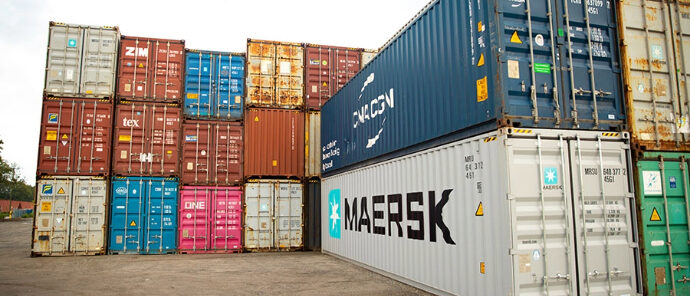
Going global
South Dakota companies find new opportunities in international trade
One trade mission to Mexico resulted in three new clients for a South Dakota processor of raw sunflower seeds for human consumption or bird food.
Cesar Garcia, who oversees export sales for Advanced Sunflower in Huron and is its south warehouse manager, said such a response means the investment of time and money in the international market was spent wisely.
“We have 12 to 15 different distributors throughout Mexico now, and it was well worth the travel time,” Garcia said. “In that business culture, they really do value visiting in person, sitting across a desk face to face, doing business the old-fashioned way with a shake of the hands.”
South Dakota is poised to expand even more than it already has into the international market, said Luke Lindberg, President & CEO of South Dakota Trade, a public-private partnership that had its grand opening in April 2023.
Currently, exports represent about 10 percent of the state’s economy.
in terms of where we can expand the most, we have to make a concerted effort to increase our manufacturing exports
The exportation of South Dakota’s agriculture products makes an impact worldwide. More than half of the soybeans grown in the state are exported, along with a third of the state’s hogs. There’s also growth in dairy exports as well, Lindberg said, “particularly as we invest in cheese-processing plants and whey production, not just milk out of a cow.”
Manufacturing represents the biggest opportunity for percentage growth, he said.
“We’ve underperformed a lot on the manufacturing side. Agriculture is the top export in dollar value terms, but in terms of where we can expand the most, we have to make a concerted effort to increase our manufacturing exports,” Lindberg said. “We’ve been lagging behind other states, and from my vantage point it represents our biggest opportunity for growth.”
Identifying the market
Joe Beck serves as executive director of corporate development at Viaflex, which designs and manufactures unique wide-width plastic films for many markets. Formerly known as Raven Engineered Films, the company was established 60 years ago.
“Traditionally we’ve made some effort into looking into how we expand internationally but nothing that was a comprehensive effort,” Beck said. “We were making sure we were handling all the business opportunities in our backyard. There’s still a lot of market share right here, but as we continue to mature and evolve and the global economy continues to change, it’s something we’re taking a deep look at.”

Viaflex is doing that by partnering with South Dakota Trade. Beck serves as South Dakota Trade’s board chairman. The Greater Sioux Falls Chamber of Commerce President & CEO Jeff Griffin also serves on the board of directors. The Chamber and Sioux Falls Development Foundation, with support from joint venture Forward Sioux Falls, work closely with South Dakota Trade in not only sharing information but supporting companies in the realm of international trade.
Currently, Viaflex’s export revenue likely is less than 5 percent of its total revenue, Beck said. No goal has been established yet for expansion into the international market, but as that focus expands, a target will be set, he said.
“I think the big key is really focusing on geographies where our product can go in and make a difference,” Beck said. “Take China for example. We would have a lot of competitors in China, so we’re not looking to penetrate the China market. That being said, we have a lot of ag products that translate to countries where there might be ag needs, like Mexico, Latin America and South America. Those are areas of interest to us.”
A team from Viaflex will go on its first trade mission this year, traveling to Japan and Taiwan in late June. When that is over, the team will measure how many business leads and opportunities it thinks are viable to pursue and how much revenue could be generated.
Garcia, of Advanced Sunflower, went on the trade mission to Mexico in September 2023. The company has always placed high importance on exporting raw shelled and unshelled sunflower kernels. Spain, Turkey and Jordan once were major players for Advanced Sunflower, but competitiveness in the international market and among suppliers has made it more challenging there.
The trip to Mexico took him to Mexico City and its Central de Abastos de la Ciudad de Mexico, a huge market where companies showcase various products. After that, accompanied by an experienced friend, he traveled to cities such as Puebla, Monterrey and Vera Cruz.
Garcia conservatively places Advanced Sunflower’s international market at 20 percent of its total business. He thinks that number can increase.
“That was big for us to go visit customers in their offices,” said Garcia, a University of South Dakota graduate who majored in international studies with a minor in business administration.
Said Lindberg, “We always say that the best opportunity to generate a sale is when you put a willing buyer and a willing seller in the same room. A lot of the international markets that are growing right now are markets that place a high value on personal relationships. Southeast Asia a great example of that. They like to do business with people they know. One of most accessible ways to do that is through a trade mission.”
The South Dakota Soybean Checkoff is tasked with promotion, education and research for that crop. The South Dakota Soybean Association monitors policies that affect soybean farmers and soybean promotion. Board members go on regular trade missions and each year host three trade missions to South Dakota, said Jerry Schmitz, executive director for the two groups. In 2023, board members traveled to the emerging market of Morocco. Potential travel this year has not yet been finalized.
“We typically visit buyers when we go to those countries and find out what they’re looking for and discuss the type of things they’re concerned about or interested in our product,” Schmitz said. “They would take us out to buildings where they were housing soy products and also housing POET products. They were familiar with our product even though we hadn’t met before.”
In May, South Dakota Trade sent a small delegation to South Africa. A larger delegation will go on a trade mission to Japan and Taiwan in late June. South Dakota Trade is in the initial stages of planning a trip to India in 2025.
Supply Chains
One thing that makes Advanced Sunflower competitive in the international market is its ability to ship via rail, Garcia said. That is also essential for POET, the world’s largest producer of biofuels. The company procures about a billion bushels of corn from farmers each year, then sends it to biorefineries where the grain is processed, and the start converted into bioethanol. That bioethanol is used in fuel.
The remaining proteins, fat, micronutrients and carbon dioxide (CO2) are then used in other products. CO2, for example, is used in food processing and soft drinks. Proteins, fiber and micronutrients are used as an animal feed that is shipped throughout the world. The oil is used primarily as a feed stock for renewable biodiesel and sustainable aviation fuel, while some also goes into the feed market.
Dried distillers grains (DDG) are a major export, said Greg Breukelman, president of POET Bioproducts.
“The DDG, which is our feed product, we produce about seven million tons of that a year,” he said. “We export a fair amount of that production. We can rail it into Mexico or Canada, which are exports. Bulk vessels can be loaded in the Gulf (of Mexico) down in New Orleans, where they load DDG on barges. Another option is a shipping container, and that’s one of the main ways to get the product to its destination overseas.”

In 2022, POET was the fifth-largest container shipper among all companies, and Breukelman expects to be in the top 15 for 2023.
POET, which began exporting its products more than 20 years ago, ships to 25 to 30 countries in any given year and has traded in 40 countries in a 12-month period.
Being a player in the international market means being prepared and having data and market intelligence on what’s going on with supply chains built to reach different parts of the world, Breukelman said.
In September 2022, POET acquired a harbor facility in Savannah, Georgia, the third-largest container port in the country and one of the fastest growing. POET now sends the DDG via rail to that facility, which unloads the rail cars, loads them into shipping containers, inspects and seals them, then trucks the containers to the port in Savannah. From there, the containers filled with DDG sail to destinations in southeast Asia, the Middle East and Turkey, among others, Breukelman said.South Dakota may not be the most logical locale to export a product like DDG, Breukelman said, but it works. He said that’s essential, because a company can build a demand but without a cost-effective way to deliver the product, it’s not sustainable.
“For our business it takes trucks and rail cars and steamships and ocean vessels and barges, pretty much everything you can think of to get our product there,” he said. “Sometimes it may take three or four of those modes to get it where it ultimately needs to go.”
State economic impact
Agriculture is South Dakota’s largest industry by far, with $5 billion of the $7 billion total ag-related. Sixty to 70 percent of the soybeans raised in the state go elsewhere, Schmitz said. The largest buyers are Canada, Mexico and Southeast Asia, although the crop is shipped all over the world.
“Back in the 2000s, China became a huge buyer,” Schmitz said. “They consume so much of the world’s soybeans that they just need to buy our product.”
Developing an international market will bring new monies into South Dakota and its communities, he said. “Those monies help to enrich not only the business but its communities,” Schmitz said. “Businesses are buying things, and tax revenue increases.”
Key industries for expansion into international trade from South Dakota are those in bioproducts, Schmitz said.
“I’m talking about feed stocks from agriculture, whether corn and soybeans, forestry, all types of different products, we have the feed stocks here like no other states,” he said. “We have the potential in our small communities.”
You need to develop those markets and educate the buyers in those markets
Products that are biodiverse or sustainable have enormous potential, Schmitz said.
Lindberg is excited about future growth in other sectors with a smaller dollar value, such as education, cybersecurity and tourism.
“Education and tourism are both considered to be exports,” he said. “Tourism is a major part of South Dakota’s economy, as well as foreign students that come and learn in our state universities. We’re beginning to work with the South Dakota Department of Tourism and have a robust partnership with the University of South Dakota to recruit more students and more visitors to our great state.”
South Dakota Trade currently is assisting a small manufacturing company in Tea that has significantly grown their exports, by helping to identify international markets, Lindberg said. His team has also begun working with a South Dakota-based whisky distiller new to exporting. It will participate in the upcoming trade delegation to Japan, helping to expose whisky to that market. A gun-manufacturing company in Rapid City that makes high-quality firearms now has contracts with several foreign governments.
“You have to have a product that has a demand in other countries,” Breukelman said. “For a product like animal feed like we have, it has demand because everybody needs to eat and not every country is as good as growing crops and feed for those animals as we are here in the United States.
“Then you need to develop those markets and educate the buyers in those markets. We have [an employee with] a PhD in animal nutrition. A big part of his job is he travels around the world, speaks at different conferences so they understand our product.”
Getting started
South Dakota Trade is working with multiple industries to target areas where it can sell its products, Lindberg said. A business or manufacturer thinking about exporting its goods should make its first phone call to South Dakota Trade, Lindberg said. Its team can help all levels of exporters to be successful, including a course for beginners to more advanced companies that participate in continuing education on topics such as supply chains and international financial instruments. South Dakota Trade can give out awards of up to $10,000 to small businesses looking to export products to foreign markets.
“The U.S. Small Business Administration put out a report this past year that looked at the total addressable market for U.S. small-business exports, and 41 percent of small businesses have a potentially exportable product,” Lindberg said. “Now, the actual number is closer to 10 percent, so there’s a 30 percent gap. Three out of 10 small businesses could be exporting products but are not.”
One of South Dakota Trade’s clients in the trust industry told Lindberg that 80 percent of its new business came from overseas last year. Now, South Dakota Trade is working with the South Dakota Trust Association to position trust companies for success in attracting new clients, Lindberg said.
Business leaders interested in expanding into international markets should take advantage of the available resources, Garcia said. In addition to South Dakota Trade, Food Export Midwest, which is part of the U.S. Department of Agriculture, is a great resource for companies selling food products. Personnel will make sure the company that wants to expand is dealing with a reputable business.
“Use your resources—government agencies both state and federal will help you get information, and information is key,” Garcia said. “Will I get paid? That’s important not just internationally but domestically, but with internationally there are fewer ways to use the law.… If you have the ability to travel and meet clients in person, do so. Even Zoom calls or webinars, use the technology we have available to access these people.”
Advised Breukelman, “I’d say do your research. South Dakota is very supportive. For those that need it, the state has a lot of resources available for companies that are looking to export. There can be a lot of risk in doing international business if you don’t know what you’re doing. But banks can help, the state has resources and trade associations have different resources to help with these things.”








